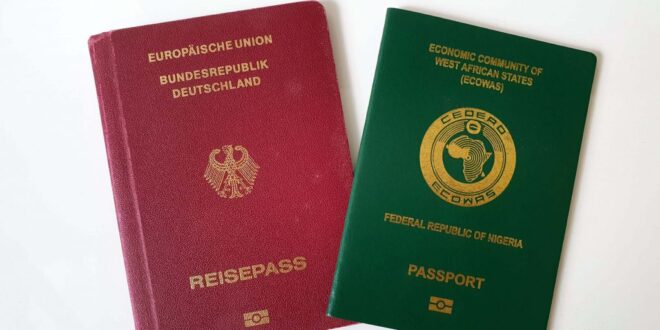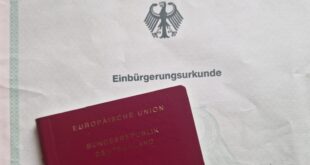The federal parliament has passed a law to make it easier for foreign residents to become German nationals. The new law on citizenship, provides for faster naturalisation. Furthermore, anyone applying for a German passport will no longer have to give up their previous nationality. For people who are dependent on state aid, however, access to citizenship is made more difficult.
The Bundestag passed the amendment to the citizenship law on Friday. In a roll-call vote, a majority of MPs voted in favour of the reform. Of the 639 votes cast, 382 were in favour and 234 against, with 23 abstentions. The SPD, Greens and FDP parliamentary groups voted in favour of the changes, while the CDU/CSU and AfD voted against. The non-attached MPs, most of whom belong to the Left Party or the Sahra Wagenknecht Alliance, abstained.
The new law provides for the following important changes:
- The period of residence in Germany required for naturalisation is reduced from the current eight to five years. In the case of “special integration achievements”, naturalisation should be possible after just three years. This is the case if someone is involved in voluntary work or can demonstrate particularly good educational, vocational or professional achievements.
- Multiple nationalities are to be accepted. Anyone who naturalises in Germany will no longer have to give up their previous citizenship. Previously, this only applied to a certain group of people.
- For people who belong to the so-called guest worker generation, written language certificates at B1 level are to be waived. Instead, it should be sufficient if they can communicate orally in German “without significant problems in everyday life”. This is intended to honour the lifetime achievements of this generation, for whom there were no language courses at the time they came to the country. The obligation to take a naturalisation test also no longer applies. This regulation should also apply to contract workers in the former German Democratic Republic (defunct East Germany).
- Children born in Germany can automatically receive German citizenship if one parent has been legally resident in Germany for at least five years.
- A further requirement for naturalisation is a commitment to Germany’s historical responsibility for the unjust National Socialist regime and its consequences, in particular for the protection of Jewish life. People who have committed anti-Semitic or racist offences should be excluded from naturalisation. This was previously the regulation, but the new law provides for closer cooperation between the naturalisation authorities and the public prosecutor’s offices in order to implement this exclusion. In addition, anti-Semitic and racist acts below the threshold of criminal liability are to be excluded from naturalisation.
- Securing one’s own livelihood should continue to be a prerequisite for naturalisation. Previously, naturalisation was possible despite receiving welfare benefits if someone was not responsible for claiming the benefits. This is now no longer the case.
For applicants who do not meet all the requirements, there is the option of “discretionary naturalisation”. In such cases, the naturalisation authority must decide whether there is a “public interest” in naturalisation and whether certain minimum requirements are met.
Naturalisation costs 255 euros for adults and 51 euros for underage children who are naturalised together with their parents.
Around 168,500 people were naturalised in Germany in 2022. Syrian nationals accounted for the largest proportion of naturalisations (around 48,300 people). Of these, around 13,900 persons were able to acquire German citizenship after just six years “due to special integration achievements”.
Foreigners who acquire German citizenship have the same rights and obligations as all German citizens. They can take part in all elections (federal, state and local elections as well as referendums) and run for political office. With a German passport, you can travel visa-free to many countries around the world and enjoy the right to freedom of movement within the EU – in other words, you can enter and stay in all so-called Schengen countries.
Felix Dappah
 THE AFRICAN COURIER. Reporting Africa and its Diaspora! The African Courier is an international magazine published in Germany to report on Africa and the Diaspora African experience. The first issue of the bimonthly magazine appeared on the newsstands on 15 February 1998. The African Courier is a communication forum for European-African political, economic and cultural exchanges, and a voice for Africa in Europe.
THE AFRICAN COURIER. Reporting Africa and its Diaspora! The African Courier is an international magazine published in Germany to report on Africa and the Diaspora African experience. The first issue of the bimonthly magazine appeared on the newsstands on 15 February 1998. The African Courier is a communication forum for European-African political, economic and cultural exchanges, and a voice for Africa in Europe.































